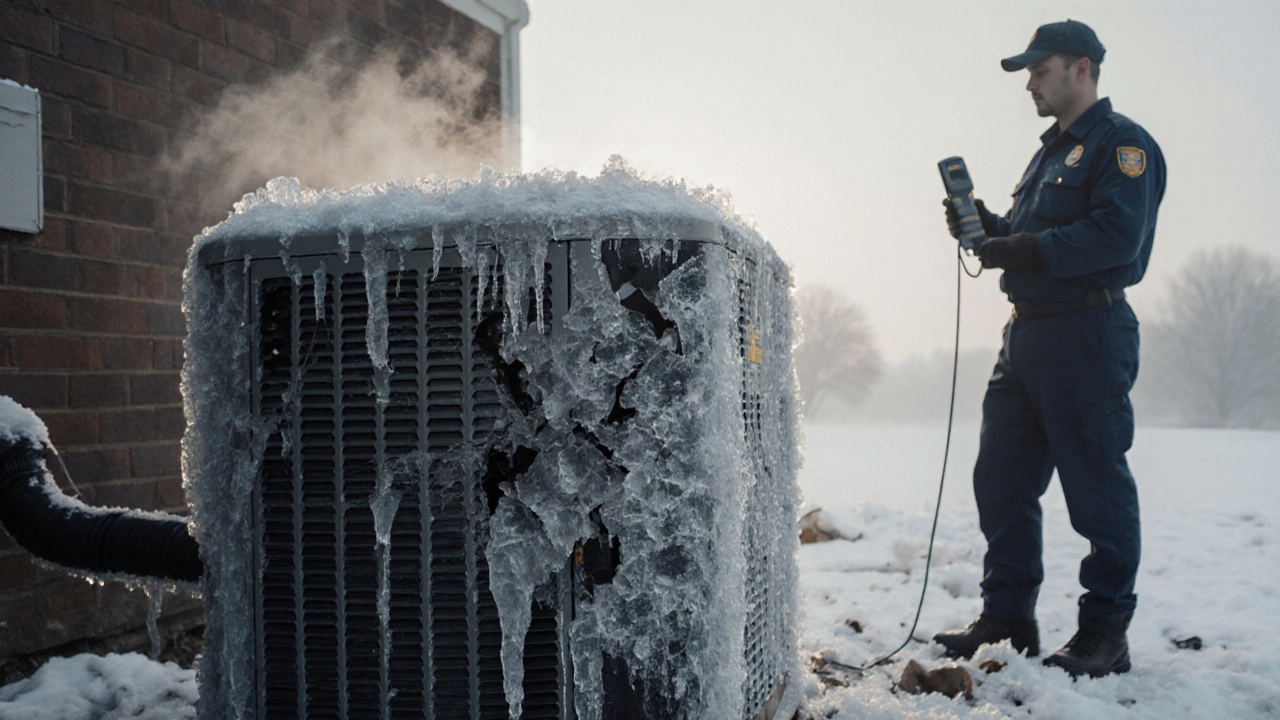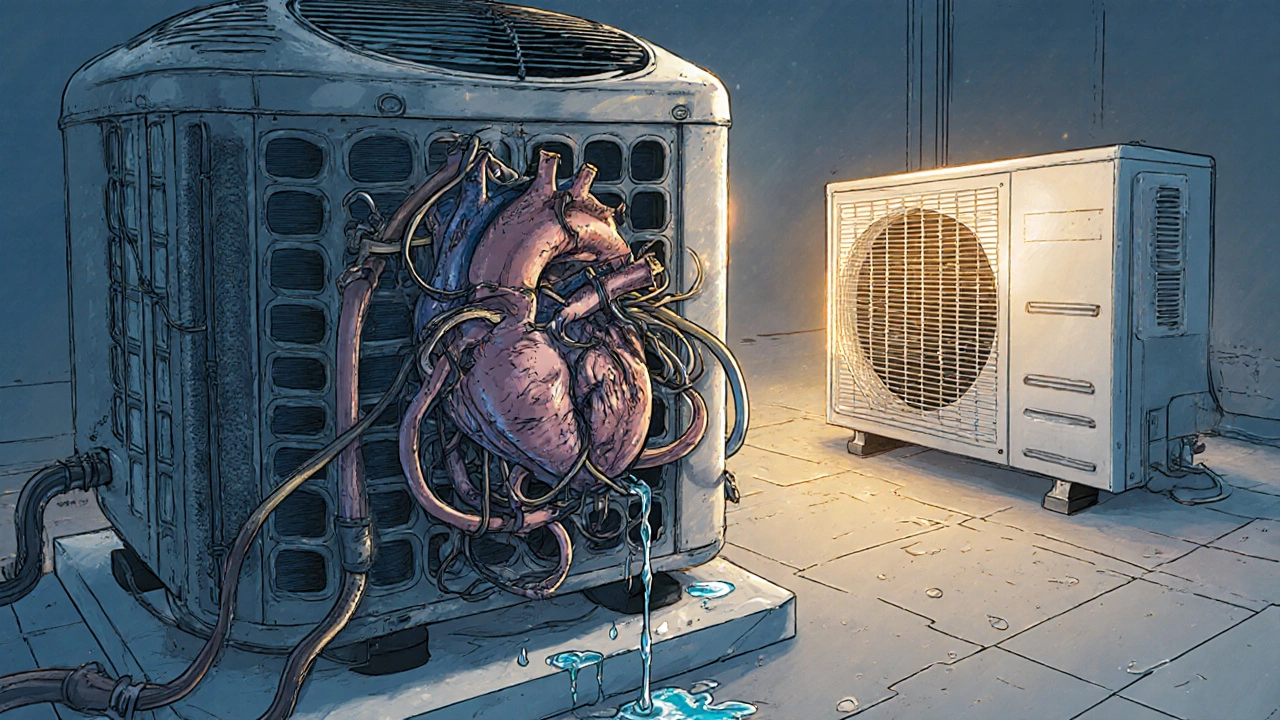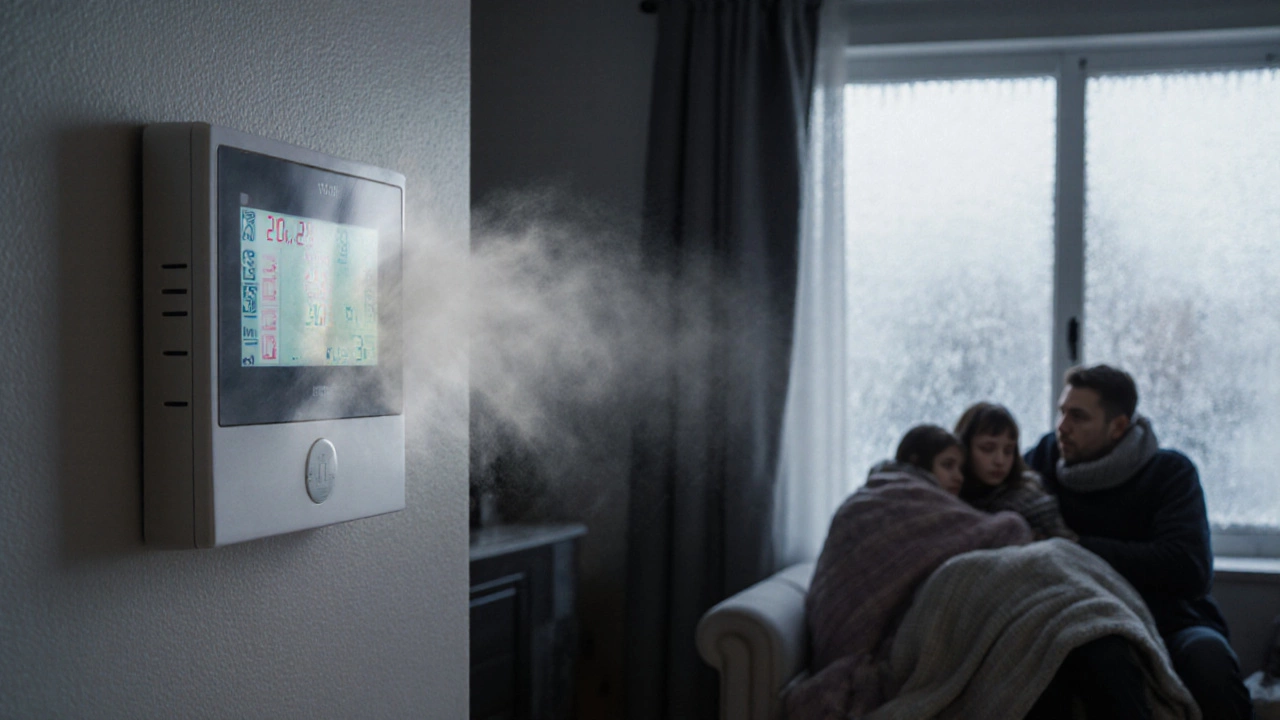Heat Pump Malfunction Detector
Identify your heat pump's issue by selecting the symptoms you're experiencing. Get tailored repair advice and severity assessment.
1. Poor Temperature Control
Home takes longer than 30 minutes to reach set temperature
2. Strange Noises
Screeching, grinding, banging, or rattling sounds
3. Ice Build-Up
Thick ice layer on outdoor unit (not just frost)
4. High Energy Bills
20%+ increase in electricity without usage changes
5. Short-Cycling
System turns on/off every 5-10 minutes
6. Wrong Air Temperature
Warm air when cooling (or cold air when heating)
7. Water Leaks
Water pooling near indoor unit (not normal condensation)
Your Heat Pump Diagnosis
Your heat pump is supposed to keep your home comfortable year-round-warm in winter, cool in summer. But when it starts acting strange, you might not know if it’s just being finicky or if it’s broken. Many people wait too long to act, thinking it’ll fix itself. It won’t. A failing heat pump doesn’t just get noisy-it starts costing you more in energy bills and can leave you without heat when you need it most.
1. Your Home Isn’t Heating or Cooling Like It Used To
If your home takes longer than usual to reach the temperature you set, that’s your first red flag. A healthy heat pump usually brings your house to target temp in 15 to 30 minutes. If it’s running for over an hour and the room still feels off, something’s wrong. This isn’t just about comfort-it’s efficiency. A heat pump that can’t transfer heat properly is working harder, using more electricity, and wearing out faster.
Check the thermostat. Make sure it’s set to the right mode (heat or cool) and that the batteries aren’t dead. If the settings are correct and the issue remains, the problem is likely with the refrigerant, compressor, or airflow.
2. Strange Noises Coming From the Unit
Heat pumps are quiet machines. A soft hum is normal. But if you hear screeching, grinding, banging, or rattling, it’s not normal. These sounds usually mean something inside is breaking or coming loose.
- A screeching noise often points to a worn-out blower motor bearing.
- A banging or clanking sound could mean a loose part inside the compressor or a broken piston.
- A rattling noise from the outdoor unit might be debris stuck in the fan or a loose panel.
Don’t ignore these sounds. A small issue like a loose screw can turn into a $2,000 compressor replacement if left unchecked.
3. Ice or Frost Build-Up on the Outdoor Unit
It’s normal to see a thin layer of frost on a heat pump during cold weather. But if you see thick ice-like a layer of snow or solid chunks-it’s a sign of trouble. Ice buildup means the defrost cycle isn’t working right.
Heat pumps have a built-in defrost mode that melts ice every 30 to 90 minutes. If the system can’t trigger this cycle, it’s usually because of a faulty defrost control board, low refrigerant, or a dirty air filter. Ice blocks airflow and forces the system to work harder, which can burn out the compressor.
Try turning the heat pump off for a few hours to let the ice melt. If it comes back within a day, call a technician. This isn’t something you can fix yourself.
4. High Energy Bills Without Extra Usage
Did your electricity bill spike by 20% or more this month-and you didn’t change your habits? That’s a classic sign your heat pump is struggling. A healthy system runs efficiently, moving heat instead of generating it. When it starts using more power to do the same job, it’s losing efficiency.
Compare your current bill to last year’s at the same time. If you’re using the same thermostat settings and the cost is up, your heat pump is likely leaking refrigerant, has dirty coils, or the fan motor is failing. These issues force the system to run longer and harder.

5. The System Short-Cycles
Short-cycling means your heat pump turns on and off every 5 to 10 minutes. It might run for a minute, shut off, wait 2 minutes, then turn back on. This is stressful on the system and wastes energy.
Common causes include:
- A dirty air filter restricting airflow
- An oversized unit that heats the room too quickly and shuts off
- A faulty thermostat sending wrong signals
- Low refrigerant causing the system to overheat and shut down
Changing the air filter is the easiest fix. If that doesn’t help, you’ve got a deeper issue. Short-cycling can destroy the compressor in as little as a few months.
6. Warm Air Coming Out in Cooling Mode (or Vice Versa)
If you’ve set your thermostat to cool and you feel warm air blowing out of the vents, that’s a major problem. The same goes for heating mode-cold air coming out means the system isn’t reversing properly.
This usually points to a faulty reversing valve. That’s the part that switches the heat pump between heating and cooling modes. When it gets stuck, the system can’t flip the refrigerant flow. It’s a mechanical failure that requires professional repair. No DIY fix will work here.
Some older units also have worn-out capacitors that cause this issue. A technician can test the valve and capacitors with a multimeter to confirm the fault.
7. Water Leaking From the Indoor Unit
Heat pumps produce condensation, and that’s normal. But if you see water pooling on the floor near the indoor air handler, that’s not. A clogged condensate drain line is the most common cause. Dust, mold, or algae build up over time and block the pipe.
Left unchecked, the water can overflow and damage your ceiling, walls, or flooring. It can also cause mold growth inside the unit. The fix is simple: clean the drain line with a wet/dry vacuum or a mixture of vinegar and water. But if the leak keeps coming back, the drain pan might be cracked or the pump inside the unit might be broken.
Check the drain line regularly-every 3 months during heavy use. A quick flush can prevent a big mess.

What to Do When You Notice These Signs
If you see one or more of these signs, don’t wait. The longer you delay, the more expensive the repair becomes. Start with the easy stuff:
- Replace the air filter. Use a MERV 8-11 filter. A dirty filter causes half of all heat pump problems.
- Clear debris from the outdoor unit. Keep at least 2 feet of space around it. Trim back bushes and remove leaves.
- Check the thermostat settings. Make sure it’s not in “emergency heat” mode unless it’s below freezing and the heat pump isn’t working.
If those steps don’t fix it, call a licensed HVAC technician. Don’t try to open the unit yourself. Heat pumps use refrigerant under pressure, and handling it without certification is illegal and dangerous.
Prevention Is Cheaper Than Repair
The best way to avoid these problems is regular maintenance. Schedule a professional tune-up once a year-ideally in the spring before cooling season and in the fall before heating season.
A good technician will:
- Check refrigerant levels and look for leaks
- Clean the indoor and outdoor coils
- Test the reversing valve and capacitors
- Inspect electrical connections and safety controls
- Clear the condensate drain
These checks cost $100-$150 but can save you $1,000+ in repairs down the road. Most manufacturers require annual maintenance to keep the warranty valid.
When to Replace Instead of Repair
Not every problem is worth fixing. If your heat pump is over 12 years old and you’re facing:
- Refrigerant leaks (R-22 units are obsolete and expensive to fix)
- Compressor failure
- Repeated electrical issues
It’s usually cheaper to replace it. New heat pumps are 30-50% more efficient than models from 10 years ago. You’ll save money on bills and get better comfort. Look for units with SEER ratings of 16 or higher and HSPF ratings of 9 or higher.
Many utility companies offer rebates for upgrading to high-efficiency heat pumps. Check your local provider before buying.


